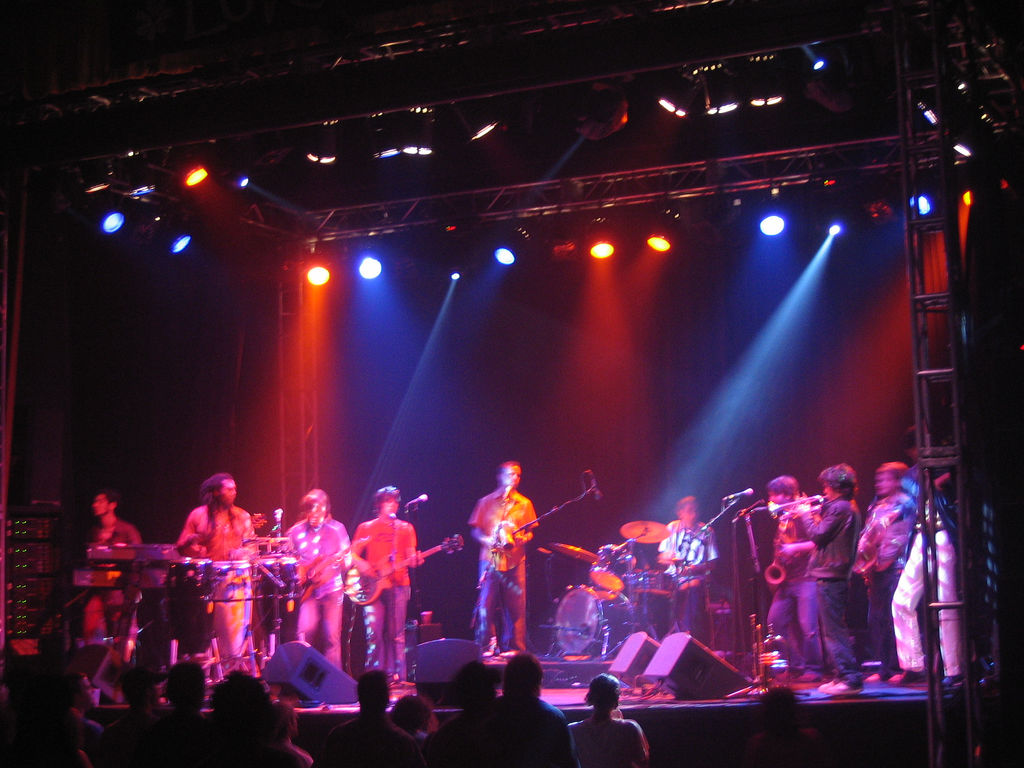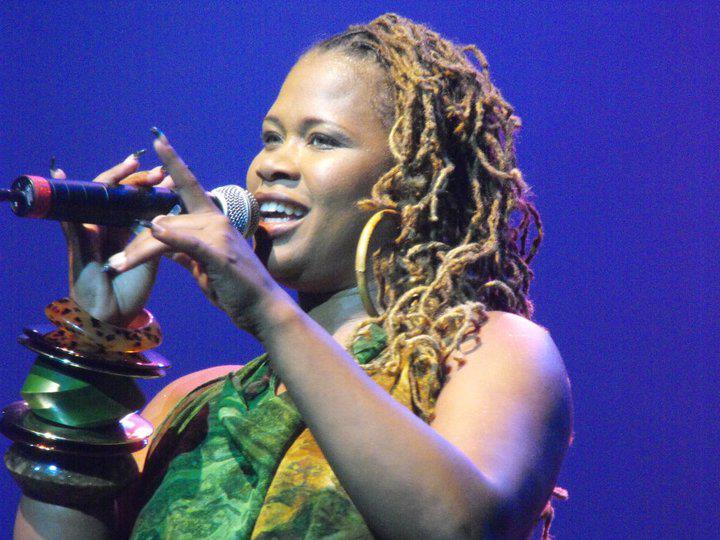|
Afrobeat
Afrobeat (also known as Afrofunk) is a West African music genre, fusing influences from Nigerian (such as Yoruba) and Ghanaian (such as highlife) music, with American funk, jazz, and soul influences. With a focus on chanted vocals, complex intersecting rhythms, and percussion,Grass, Randall F. "Fela AnikulaThe Art of an Afrobeat Rebel". ''The Drama Review''. MIT Press. 30: 131–148. the style was pioneered in the 1960s by Nigerian multi-instrumentalist and bandleader Fela Kuti, who popularised it both within and outside Nigeria. At the height of his popularity, he was referred to as one of Africa's most "challenging and charismatic music performers." Distinct from Afrobeat is Afrobeats, a combination of sounds originating in West Africa in the 21st century. This takes on diverse influences and is an eclectic combination of genres such as hip hop, house, jùjú, ndombolo, R&B, soca, and dancehall. The two genres, though often conflated, are not the same. History ... [...More Info...] [...Related Items...] OR: [Wikipedia] [Google] [Baidu] [Amazon] |
Afrobeats
Afrobeats, not to be confused with Afrobeat or Afroswing, is an umbrella term to describe popular music from West Africa and the diaspora that initially developed in Ghana, Nigeria, and the UK in the 2000s and 2010s. Afrobeats is less of a style per se, and more of a descriptor for the fusion of sounds flowing out of Ghana and Nigeria. Genres such as hiplife, jùjú music, highlife, azonto music, and naija beats, among others, were amalgamated under the "Afrobeats" umbrella. Afrobeats is primarily produced in Accra, Lagos, and London. Historian and cultural critic Paul Gilroy reflects on the changing London music scene as a result of shifting demographics: We are moving towards an African majority which is diverse both in its cultural habits and in its relationship to colonial and postcolonial governance, so the shift away from Caribbean dominance needs to be placed in that setting. Most of the grime folks are African kids, either the children of migrants or migrants them ... [...More Info...] [...Related Items...] OR: [Wikipedia] [Google] [Baidu] [Amazon] |
Tony Allen (musician)
Tony Oladipo Allen (20 July 1940 – 30 April 2020) was a Nigerian/Ghanaian drummer, composer, and songwriter who lived and worked in Paris, France. Allen was the drummer and musical director of Fela Kuti's band Africa '70 from 1968 to 1979, and was one of the founders of the Afrobeat genre. Fela once stated that "without Tony Allen, there would be no Afrobeat". He was described by Brian Eno as "perhaps the greatest drummer who has ever lived". Later in life, Allen collaborated with Damon Albarn on several projects, including Gorillaz, the The Good, the Bad & the Queen, Good, the Bad & the Queen and Rocket Juice & the Moon. Early career Allen was born in Lagos, Nigeria to James Alabi Allen, a motor mechanic from Colonial Nigeria, British Nigeria (now present day Nigeria) and Prudentia Mettle, from the Gold Coast (British colony), Gold Coast (now present day Ghana). He began playing drums at the age of 18, while working as an engineer for a radio station. Allen was influenced ... [...More Info...] [...Related Items...] OR: [Wikipedia] [Google] [Baidu] [Amazon] |
West African Music
The music of West Africa has a significant history, and its varied sounds reflect the wide range of influences from the area's regions and historical periods. Traditional West African music varies due to the regional separation of West Africa, yet it can be distinguished by two distinct categories: Islamic music and indigenous secular music. The widespread influence of Islam on culture in West Africa dates back to at least the 9th century, facilitated by the introduction of camels to trade routes between the North Africa, North of Africa and West Africa. Islam-influenced West African music commonly includes the use of stringed instruments like the ''goje,'' while more secular traditional West African music incorporates greater use of drums such as the ''djembe.'' Contemporary styles of music in West Africa have been influenced by Music of the United States, American music, South African jazz, African jazz and gospel music. The forced migration of Africans to the Americas as a res ... [...More Info...] [...Related Items...] OR: [Wikipedia] [Google] [Baidu] [Amazon] |
Fela Kuti (cropped)
Fela Aníkúlápó Kútì (born Olufela Olusegun Oludotun Ransome-Kuti; 15 October 1938 – 2 August 1997) was a Nigerian musician and political activist. He is regarded as the principal innovator of Afrobeat, a Nigerian music genre that combines West African music with American funk and jazz. At the height of his popularity, he was referred to as one of Africa's most "challenging and charismatic music performers". AllMusic described him as "a musical and sociopolitical voice" of international significance. Kuti was the son of Nigerian women's rights activist Funmilayo Ransome-Kuti. After early experiences abroad, he and his band Africa '70 (featuring drummer and musical director Tony Allen) shot to stardom in Nigeria during the 1970s, during which he was an outspoken critic and target of Nigeria's military juntas. In 1970, he founded the Kalakuta Republic commune, which declared itself independent from military rule. The commune was destroyed in a 1978 army raid that inj ... [...More Info...] [...Related Items...] OR: [Wikipedia] [Google] [Baidu] [Amazon] |
Fela Kuti
Fela Aníkúlápó Kútì (born Olufela Olusegun Oludotun Ransome-Kuti; 15 October 1938 – 2 August 1997) was a Nigerians, Nigerian musician and political activist. He is regarded as the principal innovator of Afrobeat, a Nigerian music genre that combines West African music with American funk and jazz. At the height of his popularity, he was referred to as one of Africa's most "challenging and charismatic music performers". AllMusic described him as "a musical and sociopolitical voice" of international significance. Kuti was the son of Nigerian women's rights activist Funmilayo Ransome-Kuti. After early experiences abroad, he and his band Africa '70 (featuring drummer and musical director Tony Allen (musician), Tony Allen) shot to stardom in Nigeria during the 1970s, during which he was an outspoken critic and target of Nigerian military juntas of 1966–1979 and 1983–1999, Nigeria's military juntas. In 1970, he founded the Kalakuta Republic commune, which declared itsel ... [...More Info...] [...Related Items...] OR: [Wikipedia] [Google] [Baidu] [Amazon] |
British Hip Hop
UK rap, also known as British hip hop or UK hip hop or British rap, is a music genre and culture that covers a variety of styles of hip hop music made in the United Kingdom. The development of UK rap was shaped by a distinct set of regional influences, slang, and grassroots movements that differentiated it from American hip hop. It is generally classified as one of a number of styles of R&B/hip-hop. British hip hop can also be referred to as Brit-hop, a term coined and popularised mainly by '' British Vogue'' magazine and the BBC. British hip hop was originally influenced by the dub/toasting introduced to the United Kingdom by Jamaican migrants in the 1950s–70s, who eventually developed uniquely influenced rapping (or speed-toasting) in order to match the rhythm of the ever-increasing pace and aggression of Jamaican-influenced dub in the UK. Toasting and soundsystem cultures were also influential in genres outside of hip hop that still included rapping – such as grime, ... [...More Info...] [...Related Items...] OR: [Wikipedia] [Google] [Baidu] [Amazon] |
Fuji Music
Fújì is a genre of Yoruba popular music that emerged in Nigeria in the 1960s. It evolved from the improvisational wéré music also known as ajísari (meaning "waking up for sari", performed to awaken Muslims before dawn during the fasting season of Ramadan. Fuji music was named after the Japanese stratovolcano-mountain, Mount Fuji by Alhaji Sikiru Ayinde Barrister (pioneer of wéré). It features energetic beats, diverse Yoruba rhythms, and call-and-response vocals. Fuji's influence extends into contemporary music, with its hooks and rhythms frequently appearing in Nigerian hip hop. In February 2024, professor and filmmaker Saheed Aderinto released the first episode of The Fuji Documentary titled "Mr. Fuji: Barry Wonder" which chronicles the story of Fuji music creator Sikiru Ayinde Barrister. Etymology Sikiru Ololade Ayinde Balogun Barrister significantly popularized wéré music during the 1950s and 1960s and later coined the term "fuji" for his new innovation ( ... [...More Info...] [...Related Items...] OR: [Wikipedia] [Google] [Baidu] [Amazon] |
Nigeria
Nigeria, officially the Federal Republic of Nigeria, is a country in West Africa. It is situated between the Sahel to the north and the Gulf of Guinea in the Atlantic Ocean to the south. It covers an area of . With Demographics of Nigeria, a population of more than 230 million, it is the List of African countries by population, most populous country in Africa, and the List of countries and dependencies by population, world's sixth-most populous country. Nigeria borders Niger in Niger–Nigeria border, the north, Chad in Chad–Nigeria border, the northeast, Cameroon in Cameroon–Nigeria border, the east, and Benin in Benin–Nigeria border, the west. Nigeria is a Federation, federal republic comprising 36 States of Nigeria, states and the Federal Capital Territory, Nigeria, Federal Capital Territory, where its capital, Abuja, is located. The List of Nigerian cities by population, largest city in Nigeria by population is Lagos, one of the largest List of largest cities, metr ... [...More Info...] [...Related Items...] OR: [Wikipedia] [Google] [Baidu] [Amazon] |
Funk
Funk is a music genre that originated in African-American communities in the mid-1960s when musicians created a rhythmic, danceable new form of music through a mixture of various music genres that were popular among African-Americans in the mid-20th century. It deemphasizes melody and chord progressions and focuses on a strong rhythmic groove of a bassline played by an electric bassist and a drum part played by a percussionist, often at slower tempos than other popular music. Funk typically consists of a complex percussive groove with rhythm instruments playing interlocking grooves that create a "hypnotic" and "danceable" feel. It uses the same richly colored extended chords found in bebop jazz, such as minor chords with added sevenths and elevenths, and dominant seventh chords with altered ninths and thirteenths. Funk originated in the mid-1960s, with James Brown's development of a signature groove that emphasized the downbeat—with a heavy emphasis on the first be ... [...More Info...] [...Related Items...] OR: [Wikipedia] [Google] [Baidu] [Amazon] |
Soca Music
Soca music, or the "soul of calypso", is a genre of music that originated in Trinidad and Tobago in the 1970s. It is considered an offshoot of Calypso music, calypso, with influences from Afro–Trinidadians and Tobagonians, Afro-Trinidadian and Indo–Trinidadians and Tobagonians, Indo-Trinidadian rhythms. It was created by Ras Shorty I (or Lord Shorty) in an effort to revive traditional calypso, the popularity of which had been declining amongst younger generations in Trinidad due to the rise in popularity of reggae from Jamaica and Soul music, soul and funk from the United States. From the 1980s onward, soca has developed into a range of new styles. Etymology "Soca" is a Blend word, portmanteau of the words "soul" and "calypso". The genre was defined by Lord Shorty as the "Soul of Calypso." The word was originally spelled s-o-k-a-h by Lord Shorty. In a 1979 interview with ''Carnival Magazine,'' Lord Shorty stated that he "came up with the name soca. I invented soca. And I ... [...More Info...] [...Related Items...] OR: [Wikipedia] [Google] [Baidu] [Amazon] |
Ndombolo
Ndombolo, also known as dombolo, is a genre of dance music originating in the Democratic Republic of the Congo. Derived from soukous in the 1990s, with fast-paced hip-swaying dance rhythms, often accompanied by Beat (music), upbeat, Percussion instrument, percussion-driven music, the style became widespread in the mid-1990s and the subsequent decade, dominating dancefloors in Central Africa, central, East Africa, eastern, and West Africa, western Africa. It inspired Afrobeats, West African popular music, coupé-décalé, Kuduro, and Sub-Saharan African music traditions, East African dance music. Ndombolo customarily features lead vocalists, backup vocalists, guitars, drums, and Synthesizer, synthesized sounds. The lyrics often explore themes of human relations, marriage, courtship, trickery, disappointment, and Politics of the Democratic Republic of the Congo, Congolese sociopolitical culture. Prominent musicians such as Papa Wemba, Dany Engobo, Koffi Olomide, Werrason, Awilo Lo ... [...More Info...] [...Related Items...] OR: [Wikipedia] [Google] [Baidu] [Amazon] |







